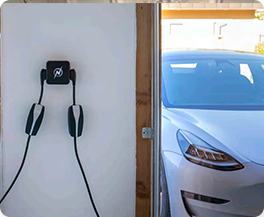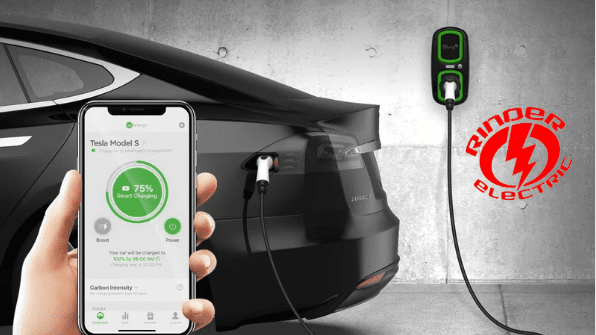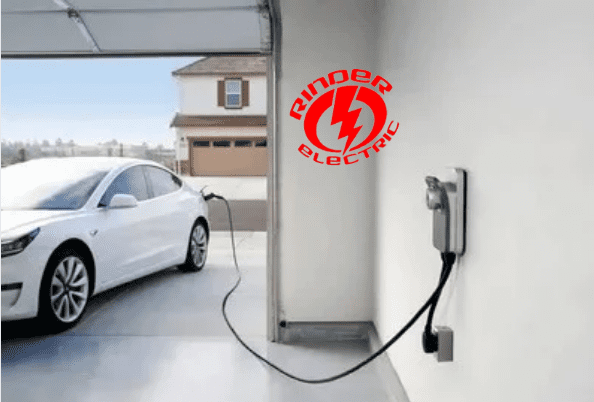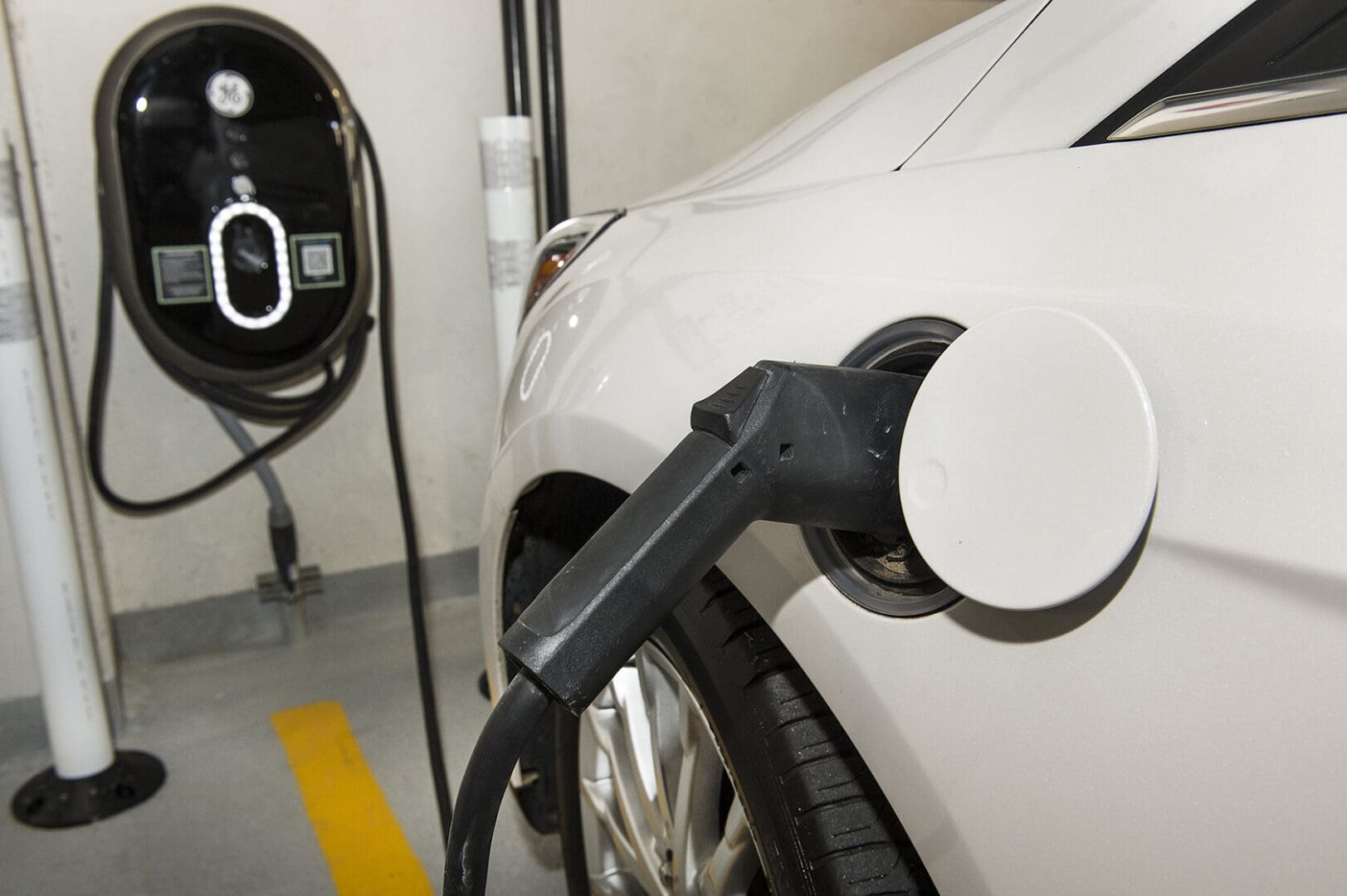Charge Electric Vehicles at Your Home or Business
Electrical Vehicle Charging Station Installation
Let our professionals determine the correct voltage and amperage for your vehicle charger. Our qualified service techs are capable of estimating the cost and location of your vehicle charger installation.
With the growing number of plug-in electric vehicles (PEVs), installing residential and commercial charging stations becomes essential. These are also known as electric vehicle supply equipment (EVSE).
Jurisdictions can use this guide as a template to provide clear information about residential and commercial EVSE permit requirements.
What You Need To Know
Plug-In Installation
A NEMA 14-50 electrical plug is used to plug different types of stations into a home or office. When working with an electrician, you must request them to install a NEMA 14-50 receptacle for the rating of your JuiceBox (usually a 40A or 50A circuit).
Ensure the receptacle is installed close to where you plan to mount your charging station. Please note that the NEMA 14-50 input cable is around 1.7 feet long. Additionally, the ground prong is farthest away from the JuiceBox.

Switching to Electric Vehicles
Electric vehicles are in the front row of technology. It’s only a matter of time before we all switch to PEVs. If you’re planning to purchase one, it’s ideal to have highly qualified electricians knowledgeable about electric vehicles.
This is why we are here. We can determine the correct amperage and voltage your PEV needs. Moreover, we can research what you require for your new electric vehicle charger installation.
You can count on us to install your EVSE properly. This will help prevent your PEV’s wiring and batteries from shorting off, which could lead to costly vehicle repairs.
Get Started
Reach out to us to request any of our electrical services. We hope to get the opportunity to serve you.
As electric vehicles (EVs) become increasingly popular, the demand for vehicle charging stations has surged. Installing a vehicle charger at home or in commercial spaces is essential for ensuring that EV owners have convenient access to charging facilities. This guide will explore the different types of vehicle chargers, the installation process, benefits, and important considerations for successful charger installations.
Types of Vehicle Chargers
Level 1 Chargers:
Description: Level 1 chargers use a standard 120-volt outlet, which is typically the same outlet used for household appliances.
Charging Speed: They provide about 4–5 miles of range per hour of charging, making them suitable for overnight charging.
Installation: Minimal installation is required; simply plug the charger into an existing outlet.
Level 2 Chargers
Description: Level 2 chargers operate on a 240-volt outlet and are commonly found in residential and commercial settings.
Charging Speed: They offer about 25–30 miles of range per hour of charging, significantly reducing charging time.
Installation: Requires professional installation, including electrical upgrades if necessary.
DC Fast Chargers
Description: DC fast chargers provide rapid charging capabilities and are typically found in commercial and public charging stations.
Charging Speed: They can charge an EV to 80% in as little as 30 minutes, making them ideal for long trips.
Installation: These chargers require significant electrical infrastructure and should be installed by professionals.
The Installation Process
Site Assessment
- Evaluate the location where the charger will be installed. Consider factors such as accessibility, proximity to the electrical panel, and potential obstructions.
Electrical Capacity Check
- Assess the current electrical system to determine if it can support the additional load of the charger. This may involve upgrading the electrical panel or wiring.
Choosing the Right Charger
- Select the appropriate type of charger based on your needs, such as charging speed and frequency of use. For home use, a Level 2 charger is often recommended.
Obtaining Permits
- Check local regulations and obtain necessary permits for the installation. Some areas may have specific codes or requirements for EV charger installations.
Professional Installation
- Hire a licensed electrician to install the charger. This ensures safety, compliance with electrical codes, and proper functioning of the charger.
Testing and Commissioning
- After installation, test the charger to ensure it operates correctly. Check for any faults and ensure that it communicates properly with the vehicle.
Benefits of Vehicle Charger Installations
Convenience
- Having a charger at home or work makes it easy to charge your vehicle overnight or during working hours without the need for frequent trips to public charging stations.
Cost Savings
- Charging at home can be more economical than using public charging stations. Many utility companies offer lower rates for overnight charging.
Increased Property Value
- Installing a charger can enhance the value of your property, making it more attractive to potential buyers, especially as the demand for EVs grows.
Environmental Impact
- By supporting electric vehicle usage, charger installations contribute to reducing carbon emissions and promoting sustainable energy use.
Support for Fleets
- Businesses with electric vehicle fleets benefit significantly from installing chargers on-site, allowing for efficient and cost-effective fleet management.
Considerations for Charger Installations
Location
- Choose a location that allows for easy access to the charger while considering the layout of your property or business.
Charger Compatibility
- Ensure the charger you choose is compatible with the vehicles that will be using it. Different EVs may have different charging connectors.
Future Expansion
- Consider potential future needs. If you plan to add more EVs or chargers, consult with your electrician about designing a system that can accommodate future expansions.
Safety Features
- Look for chargers with built-in safety features, such as overcurrent protection, surge protection, and weatherproof enclosures for outdoor installations.
Incentives and Rebates
- Research available incentives, tax credits, or rebates for EV charger installations. Many states and local governments offer financial assistance to encourage the adoption of EV technology.
Conclusion
As electric vehicles continue to gain traction, the importance of vehicle charger installations cannot be understated. Whether for residential or commercial use, the right charger can provide convenience, cost savings, and environmental benefits. By understanding the types of chargers available, the installation process, and the various considerations involved, individuals and businesses can make informed decisions that support the growing demand for electric vehicle infrastructure.
Investing in vehicle charger installations is a step towards a more sustainable future, making it an essential consideration for anyone looking to embrace electric mobility.






